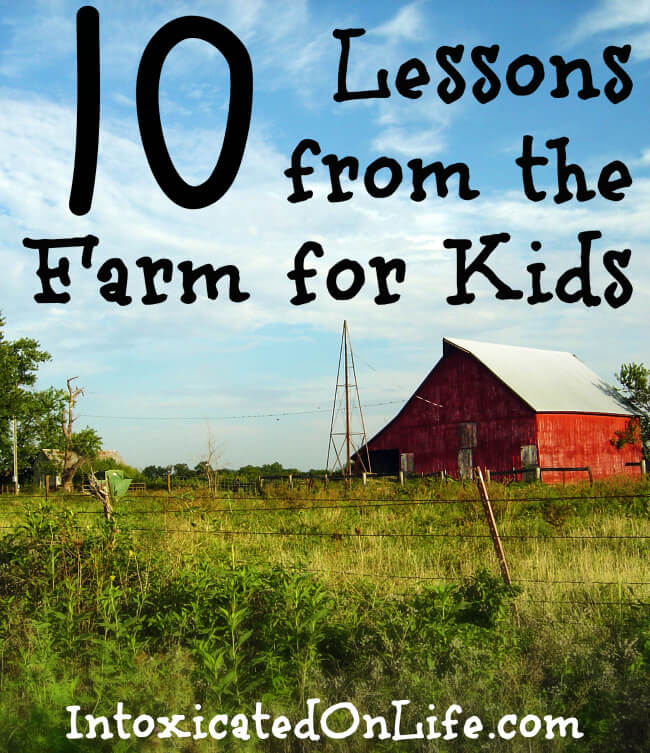In 2010, my husband made a decision that turned my world upside down. It was a decision that I didn’t like at all and that totally made me question his sanity.
You see, my husband was a software engineer in Corporate America. Every morning he left the house at 5 AM and drove the hour or more that it took to get from our small country home to Dallas. He spent his days working in a windowless cubicle then came home at night, usually arriving long after our children had already gone to bed. It wasn’t unusual for several days to go by without him seeing his children awake.
“This is not the life I want,” he told me one evening. “I’m going to quit my career and become a farmer.”
I would like to tell you that I sweetly said, “Ok, honey. We’ll be fine. All we need is love and water.” But that wouldn’t be quite true. There was serious drama in our home that night. I begged and pleaded with him to change his mind and to just leave things as they were, but he had already made his decision. He was determined and started tilling up our yard.
As I watched our new life unfold before me, I began to warm up to the idea of farming. True, we had taken a 75% pay cut. True, over the next two years Texas suffered a serious drought and the only thing our farm actually produced was a nifty little blog. My very comfortable life had turned into a struggle, but as time went on I began to see that the real fruit we were reaping wasn’t out in the orchard, it was in our children! Farm life is a completely different culture than we were all used to and it was teaching us so many virtues that will serve us well in any area of life!
Below are ten virtues farm life is teaching us. You can implement much of this in your home too, even if you don’t live on a farm!
Lessons from the Farm
1. Compassion for Animals
The animals are completely dependent on us. If we forgot to feed them, they would go hungry. If we forgot to give them water, they would be thirsty. We live by an old French expression that says, “A good man feeds his animals before he feeds himself.” This has been a very tangible way to teach compassion and empathy.
2. Respect for Nature
Nowhere is anyone as close to nature as on a farm. Here, we see animals being born and we bury them when they die. We participate in every part of the crop cycle and see first-hand how the land gives and sustains life. If there is a drought, a hailstorm or a late frost we are directly impacted in a very real way.
3. Creativity
In the city, there are Chuck E. Cheeses, Laser Tag Centers, roller skating rinks, paint ball facilities, and special programs for kids at the YMCA. Children growing up on a farm don’t have easy access to these forms of entertainment. Instead they turn to each other and their imaginations to create their own entertainment! They spend hours and hours playing hide and go seek, jumping in the hay together and building forts or tree houses using whatever scrap materials they can find.
4. Teamwork
There is so much work to do on a farm, that a farm family really needs to work together as a team if everything is going to get done! Sometimes this means working together to get all the green beans picked and canned or all the seeds planted before the rain. Other times it means that each person is working separately on different chores in order to get everything done. Either way, each family member is a vital part of our farm’s success!
5. Value of Hard Work & Discipline
Everywhere you look on a farm there is work waiting to be done. Because all hands are needed, the children naturally learn how to tend a garden, use tools, drive the tractor, fix things and do anything else that needs to be done. They wake up early because the day starts early. Their self esteem comes from pride in a job well done and they learn self-discipline along the way.
6. Problem Solving Skills
When something breaks on the farm, we can’t always just run to the store and buy the part we need. We live too far out in the country for trips to town to be convenient and there isn’t always money to fix what needs fixing. We often have to be creative and see if we can use what we have to make things work.
7. Value of Money, Frugality, and Good Stewardship
Small-time farmers don’t make a lot of money, which means there isn’t extra money floating around the family for luxuries like “allowance.” If the children want money, they have to work for it. At a very young age they make the “work = money; no work = no money” connection, which is an attitude that will serve them well through life! And, since money is hard to come by, we all see how important it is to be frugal and take good care of the things we already have.
8. Generosity
There may not be much money, but a farm provides so many opportunities to be generous! During harvest there is an abundance of fruit and vegetables and it is always so rewarding to share! Our hens lay several eggs a day and it is always fun to surprise an elderly neighbor with fresh eggs. Our children see the Lord’s math in action firsthand: The more we give away, the more we have!
9. Patience
Farming teaches patience! We might plant something this week but not be able to eat what we planted for several months (or years in the case of fruit trees!) There is no instant gratification on a farm! Instead, farm life teaches children to step back and look for the bigger picture.
10. Faith in God
Although we are all dependent on God, our complete reliance on Him is abundantly obvious on a farm! We know we are at the mercy of God and completely dependent on Him for provision. This causes us to spend a lot of time on knees in prayer!
My children may or may not grow up to be farmers, but they lessons they are learning here will serve them will in anything they choose to do later in life. They appreciate life, they appreciate their food, they know how to work hard, and they’re gaining practical skills. The longer we farm, the more value I see in our new lifestyle. As visitors come to our farm, I have begun to see our life through their eyes. One little girl visited from the city and told her father that night, “Today was the best day of my life.” I wish that all children could have these experiences!
A Fun Way to Teach These Lessons from the Farm
Quitting your job, selling your home and moving out into the country to start farming is not a possible (or sane!) approach for most people. So, earlier this year I launched our Farm Mail Club so that children across the United States can receive monthly letters about what life on a small American farm is like and where our food really comes from. If you’re interested in more information click here or watch the video below: (If you are reading this in your email or RSS feed, you may have to click through to the blog to see the video.)
What are some ways that you teach virtues to your children? I’d love to hear from you in the comments below!
(If you’ve not subscribed to the intoxicatedonlife.com email list, you’ll want to do that now. We have a special coming just for our subscribers in the coming week that will be from Letters from the Farm!)













Thank you for putting your lessons down for us to read. I have the opposite experience — I grew up on a farm on a gravel road in the middle of “nowhere” midwest and now live in the big city. I proudly tell everyone I am an Iowa farmgirl living in Phoenix and so appreciate every single point you listed. My parents and grandparents instilled the same lessons in me and there are certainly times when I wish for the “simple” farm life! Good luck to you all!
Michelle @ On A Wing And A Prayer
Sounds like you’ve had a chance to learn lessons in many different areas! 🙂 I enjoyed hearing about Alina’s experience on the farm and all they have learned as I’ve never lived on the farm before. Thanks for stopping by.
Just stumbled across this post while looking for inspiration for a presentation in my sons first grade class on farm living. I lived on a small farm in New England – and this is a wonderful representation of my childhood experience. I currently live in Singapore – and I am trying to instill the same values living in a city-state in S.E. Asia that I learned growing up on a small family farm in New England. Sometimes this is a real challenge. Thank you for posting this!
Glad you found it helpful!